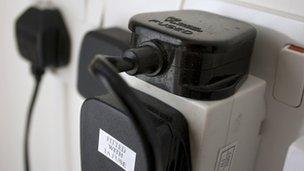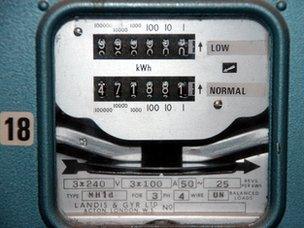'Tough' rules govern smart meter data sharing
- Published

Smart meters will let consumers know how much power they are using
Consumers should be able to decide how much data smart meters surrender about their energy use, says the government.
The plan to give consumers control is part of official guidelines for the mass rollout of smart meters - devices that show exactly how much electricity and gas is being used - to UK homes.
The meters should be fitted in 30m UK homes by 2019, at a cost of £11.7bn.
The guidelines come as FBI warnings emerge about attacks on smart meters that make them report low energy use.
Cold call
The government proposals lay out technical specifications for the 53 million smart meters it wants installed in UK homes by the end of 2019. The move to bring in the gadgets aims to reduce power use, cutting bills and helping the government meet energy efficiency targets.
Mass roll-out of smart meters is due to start in 2014 and energy firms are expected to shoulder most of this cost.
But the government believes the high cost of the mass rollout will be offset by the £7bn or so of savings it will bring about for both consumers and power suppliers.
Audrey Gallacher, director of energy at Consumer Focus, said the watchdog group broadly welcomed the proposals.
She added: "We continue to have concerns that the costs of the scheme may be underestimated and that costs for consumers could rise."
The guidelines cover what energy firms can do when installing meters. Energy minister Charles Hendry said the installation rules were "tough" because fitters would not be allowed to try to sell consumers more services during installation.
In addition, all households fitted with the gadgets must get an in-home display that logs how much power is being consumed.
Alongside the guidelines goes a consultation exercise to find out what should happen to detailed energy use data. The government proposes that consumers choose who can access this information. Basic data used for billing will be available to suppliers without asking.
Security problems
The UK's guidelines were unveiled as an FBI document came to light that warned about growing numbers of hack attacks on smart meters.
<link> <caption>Publicised by computer security expert Brian Krebs, the document</caption> <url href="http://krebsonsecurity.com/2012/04/fbi-smart-meter-hacks-likely-to-spread/" platform="highweb"/> </link> voiced the FBI's fears that the hacking of meters were likely to spread.

Older "dumb" meters have caused trouble because they led to bills being estimated
Released in 2010, the document detailed an attack on the meters that supplied usage data to a Puerto Rican electricity generator.
The FBI found that using cheap tools and software available online former employees of the power firm and meter maker made gadgets under-report energy use by up to 75%.
Another trick involved placing a strong magnet on the smart meter to stop it collecting usage data while still providing power.
The fraudsters cashed in by charging consumers and businesses for cutting their bills.
The Puerto Rican power firm estimated that it could lose millions of pounds in revenue from the hacks.
Security problems with smart meters have been uncovered by security researchers in Germany who managed to intercept detailed information about energy use.
<link> <caption>Dario Carluccio and Stephan Brinkhaus also got historical data about</caption> <url href="http://www.youtube.com/28c3#p/u/54/YYe4SwQn2GE" platform="highweb"/> </link> energy user from web servers that were only supposed to surrender the data to individual customers.
In 2010, Professor Ross Anderson from the University of Cambridge computer science department wrote <link> <caption>a report which said the widespread use of smart meters introduced a "strategic vulnerability"</caption> <url href="http://www.cl.cam.ac.uk/~rja14/Papers/meters-offswitch.pdf" platform="highweb"/> </link> into UK infrastructure.
Prof Anderson said smart meters would be a tempting target for malicious and irresponsible hackers.
- Published17 January 2012
- Published15 January 2012
- Published17 January 2012
- Published8 March 2012